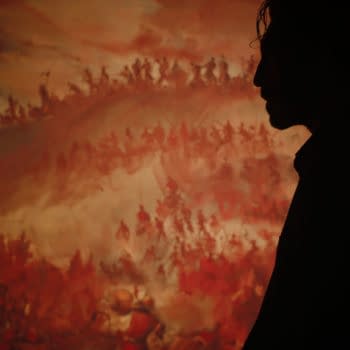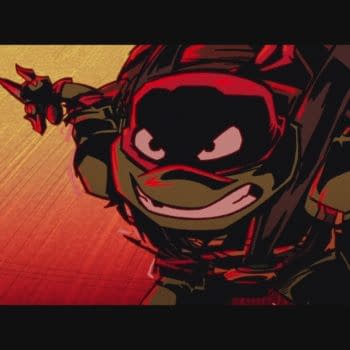Posted in: Movies, Video Games | Tagged: bioware, Dragon Age: Inquisition, entertainment, mass effect, video games
Dragon Age: Inquisition – Exquisition
By Patrick Dane
Bioware's work on Mass Effect ranks among some of my favorite in all of gaming. The blending of narrative prowess and bombastic blockbuster action is a potent mix that makes it one of the biggest, yet personal AAA experiences you can get. That's why it's strange that I've never gotten into the Dragon Age series with any serious investment. Perhaps it was how cumbersome the games looked in play or it just got buried under and ever growing pile of missed games. Whose to say? But what I do know is that I felt a little out of the loop coming into Dragon Age: Inquisition. I was worried it would be like jumping straight into Mass Effect 3 with no context.
Now why start a review about with personal feelings? Mostly because I know I am not alone. I'm sure there are plenty who have never touched the series and now three games into it, they worry that they will have to play the other two to get into it. I'm here to tell you, you don't and if that stops you from picking up Dragon Age: Inquisition you'd be missing out on one of the best games of the year.
Taking place soon after what I believe to be the end of Dragon Age 2, you play as a new, user created character, with choices of several fantasy races and classes. Nothing too out the ordinary with a choices like Elf, Human, Dwarf, warrior, mage rogue (The only one that will stick out as Dragon Age specific is the Qunari who are basically huge horned humanoids.) Once you have forged your Avatar, you are thrust into a huge fantasy world. The journey starts with you being involved in a explosion that has left a massive rift in the sky, spewing demons onto unsuspecting mortals. You're treated with suspicion since you are the only one to survive the catastrophe and you have a unique ability to close these rifts. The accusations fly because religious leader, the Divine, (basically a female pope) was killed in the incident. However, it becomes clear to most that this was an attack perpetrated by someone else and in an attempt to find out who, the Inquisition is born.
From there, the world continues to open up. Don't take that lightly either. There's easily 40 hours to the main storyline, but that's minuscule compared to how much extra can be done. I've heard stories of people's playthroughs taking up to 150 hours. This is a HUGE game. While it starts off small, it continually reveals more and more, until you're certain it can't possibly get bigger. That's when you realise you are only half way through the game. This is a huge commitment, but one pays off if you make the investment.
That is largely down to a story that is continually engrossing and filled with deep and rich lore. Like I said, if you are like me and this is your first Dragon Age, you might find yourself a bit lost at points, but a quick trip to the codex will clear up any confusion about what a Circle of Magi is and why Templars and Mages are at war. The journey is almost always enthralling, propelled by drive to uncover the plots of your enemies. These are huge stakes and it thrusts you tight into the middle of all of them.
Now, just like Mass Effect, without strong characters this is just another 'end of the world' story. The emotional context for your journey will come from your personal interactions with your council and party members. The host of characters you interact with are unique and your journey will no doubt be given a greater context if you take the time to interact with them. The supporting cast is what gives Bioware's narratives their emotional texture and Dragon Age is no different. I don't know if I would take these lot over those in Mass Effect, but it's a close run thing. (On a whole other side note, someone needs to give Freddy Prince Jr. some kind of award for his portrayal of Iron Bull. The dude is having just way too much fun.)
As for the combat, there is tons to admire too. There are times in the narrative driven games where it can feel like conventional play gets in the way of the narrative progression and character interactions. I don't think that is the case here. In fact, the level up system helps personalise your relationships with your squad even more. Choosing what skills each character should take up helps define who these characters are. Is your Iron Bull a tank or a heavy hitter? Does your Dorian focus on flames or the reviled necromancy? Is your Sera about sneaking around or shooting arrows? While there are no true story ramifications for going one way or another, it helps give these characters defining attributes in combat so you can create dynamic match ups.
The actual art of combat is incredibly varied and it is predicated on a huge amount of choice. Once you enter a skirmish, there is a wide pallet of options to consider. The system has a 'tactical' mode, where you can freeze time to find out an enemy's weaknesses and line up a chain of attack from each character. This will be determined by the group you have brought with you, which is where the real variety comes from. You could go with a tank, a heavy hitting warrior, a damage focused Rogue and a healer or, if you were crazy, all heavy hitting characters. It really is up to you to define your preferred squad for every situation. It's smart combat and isn't often getting in the way of the narrative.
Besides that, you will spend a lot of your time exploring the numerous and varied areas that span from enchanted forests and silent deserts. This exploration is encouraged so you can get all kinds of currencies from completing tasks. From power points, to influence, to experience and money, there is plenty of incentive to go out and explore. Influence and Power are useful for dealings on the War Table. This is a really interesting mechanic that helps you track the Inquisition's power over Thedas. It's essentially a huge map of the continent and it lets you micromanage missions. There will be several tasks available at anyone time and you can send one of your advisers to go and deal with it in one way or the other. Once the allotted time is up, the mission is complete. Usually all that happens is you get a small report and a few resources, so the emotional impact often feels a little subdued compared to the rest of the game. However, it does always help to make your efforts with the Inquisition feel like they have a bigger impact than just the story you are experiencing. That is important in a game like this.
If I do have one gripe it is with the Power system or rather, the application. At its core it is a great idea. It encourages you to explore and gives you lore centric reasons to go and do side quests. If you go out and help someone, perhaps they will join the Inquisition, or maybe even pledge the group they command to your cause. This gives the Inquisition power points to spend and unlock main missions. The problem is, as the game goes on, it actively stops your progression with the main quests as it asks for more and more power points. So, if you did really want to just get to the next story part, you might find yourself trudging around areas doing menial tasks. It is a minor gripe, and in a way paces the game. The issue is in the later stages where it can feel like a barrier to progression.
As with any game this big, there are going to be some quests, areas and storylines that aren't as strong as others, but honestly, the amount of polish for a game this size is staggering. The world is beautiful and you'll never be left wanting for something to do. This is a deep game that rarely sacrifices detail for breadth. That is increasingly rare in a game industry that has had several stumbling blocks this quarter with much smaller campaigns. Dragon Age: Inquisition is a staggering RPG. It's unique to get a game this big, with this much detail as well as a personable characters who journey with you. If you are looking to go on an adventure and are not frightened by the possible 100 hour commitment, I can't recommend it enough.
Patrick Dane, once a would be filmmaker, has somewhat accidentally found himself as an entertainment journalist over the past two years. You may recognize him from around these parts, or you may not. Who's counting? From E3 to SDCC to the Top Gear track, Patrick has explored the world of entertainment wherever it has taken him. He is always happy to talk words at you. Hopefully the ones above will suffice your needs.


![[Image 1]](https://mlpnk72yciwc.i.optimole.com/cqhiHLc.IIZS~2ef73/w:600/h:337/q:75/https://bleedingcool.com/wp-content/uploads/2014/12/Image-1.jpg)
![[Image 2]](https://mlpnk72yciwc.i.optimole.com/cqhiHLc.IIZS~2ef73/w:600/h:337/q:75/https://bleedingcool.com/wp-content/uploads/2014/12/Image-2.jpg)
![[Image 3]](https://mlpnk72yciwc.i.optimole.com/cqhiHLc.IIZS~2ef73/w:600/h:337/q:75/https://bleedingcool.com/wp-content/uploads/2014/12/Image-3.jpg)













